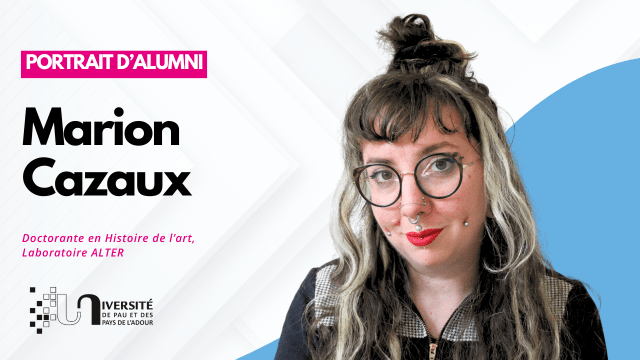After completing a Bachelor’s degree in Art History and Archaeology at UPPA, Marion Cazaux joined the Master's program in History, Civilizations and Heritage. A PhD student, she is finalizing a thesis on "Self-representation and queer performative practices, from 1980 to the present day."
What led you to choose the Art History and Archaeology program at UPPA?
After earning a high school diploma in economics and social sciences in Pau, I spent a year in Berlin as an au pair. At the same time, I took philosophy and contemporary art history courses at Humboldt Universität, in English and German. That first contact with the subject was decisive. The following year, I enrolled in the first year of the Art History and Archaeology program at UPPA. In the third year, I leaned more toward art history, especially the contemporary period. I enjoyed doing research, preparing presentations, and giving talks. Several professors advised me to pursue a research-oriented master’s, so I chose the History, Civilizations and Heritage program, still at UPPA. I must thank my thesis advisor, Sabine Forero-Mendoza, who supported me on a rarely addressed topic: cross-dressing from 1900 to 1980. It’s a theme I am continuing today in my PhD, focusing this time on "Self-representation and queer performative practices" from 1980 to the present.
What is your relationship with UPPA?
UPPA was a place of personal development for me. I could have gone to a bigger university – in Paris or Toulouse – more specialized in gender studies than Pau. But I preferred UPPA for its local presence, which matched my vision of higher education. I also appreciated the richness of student life and culture on campus, especially through Art&Fac, an association created in 2001 for UPPA art history students. I joined it in my first year and was president for two years. Student associations played a key role in my journey. I organize one or two exhibitions per year at La Centrifugeuse and the Library on the theme of cross-dressing and drag. I also helped create a local drag scene in Pau, with a show program that’s attracting an increasingly large audience. That’s why staying in Pau was important to me. I also wanted my research to have a local impact, for the drag community in Pau to feel acknowledged.
You’re defending your thesis at the end of 2025. How do you see the future?
Since 2018, I’ve always worked alongside my PhD. I’m currently a freelancer and an art mediator for a social work organization. I also teach courses at UPPA in the Art History and Archaeology bachelor's program and the Heritage and Museums master's program as a temporary lecturer. I’m passionate about teaching and want to continue on that path while staying connected to young artists and organizing events.
Two or three words you spontaneously associate with UPPA?
Solidarity – Student associations – Proximity
Any advice for students?
I would tell them not to hesitate! Art history leads to many careers beyond the obvious ones – it’s an incredible field. But you have to be ready for long studies. A bachelor’s degree is no longer enough to get a job... I would also advise them to use their study time to take in as much culture as possible – exhibitions, museums, concerts, events – to complement their courses, refine their interests, and build a network. As for choosing a university, Pau is one of those places where students are not just numbers. Exchanges with professors and the administration are easy and supportive. All questions are valid, and there’s always someone to answer them.
Interview by Florence Elman
Want to learn more?
Bachelor in Art History and Archaeology Master in History, Civilizations and Heritage

Comments0
Please log in to see or add a comment
Suggested Articles


